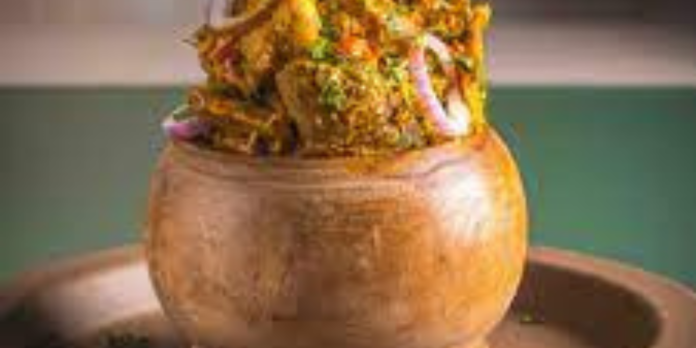Table of Contents
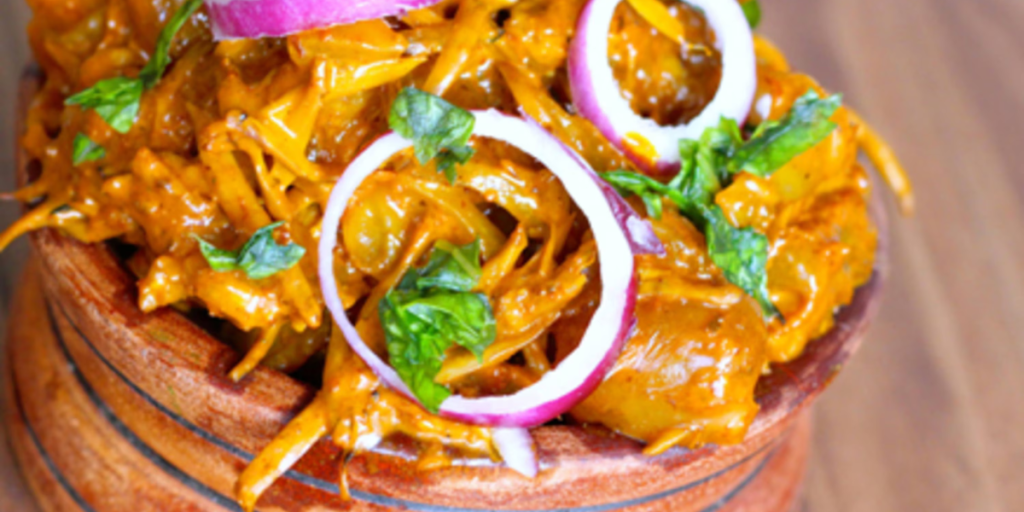
Nkwobi : Nigeria, the most populous country in Africa, is renowned for its diverse and rich culinary traditions. Each region offers unique dishes, contributing to the vibrant food culture that defines the nation. Among these numerous culinary delights, one dish stands out for its exquisite taste, cultural significance, and the way it brings people together: Nkwobi. This article delves into the history, ingredients, preparation methods, cultural importance, and variations of Nkwobi, celebrating it as one of Nigeria’s best meals.
Historical Background
Nkwobi is a traditional Igbo delicacy, deeply rooted in the culture of southeastern Nigeria. The Igbos, one of the three major ethnic groups in Nigeria, are known for their cuisine, which features bold flavors, indigenous spices, and a variety of textures. Nkwobi, primarily made from cow’s foot, exemplifies the Igbo people’s ingenuity in transforming simple ingredients into a gourmet experience.
Origins and Evolution
The origins of Nkwobi can be traced back to ancient times when the Igbo people first settled in their current region. Cattle rearing was a significant aspect of their livelihood, and every part of the cow was utilized to minimize waste. The cow’s foot, though tough and gelatinous, was ingeniously turned into a delicacy through meticulous cooking and seasoning. Over time, Nkwobi evolved from a humble, home-cooked meal into a sought-after dish served in high-end restaurants and local bukas (eateries).
Ingredients and Their Significance
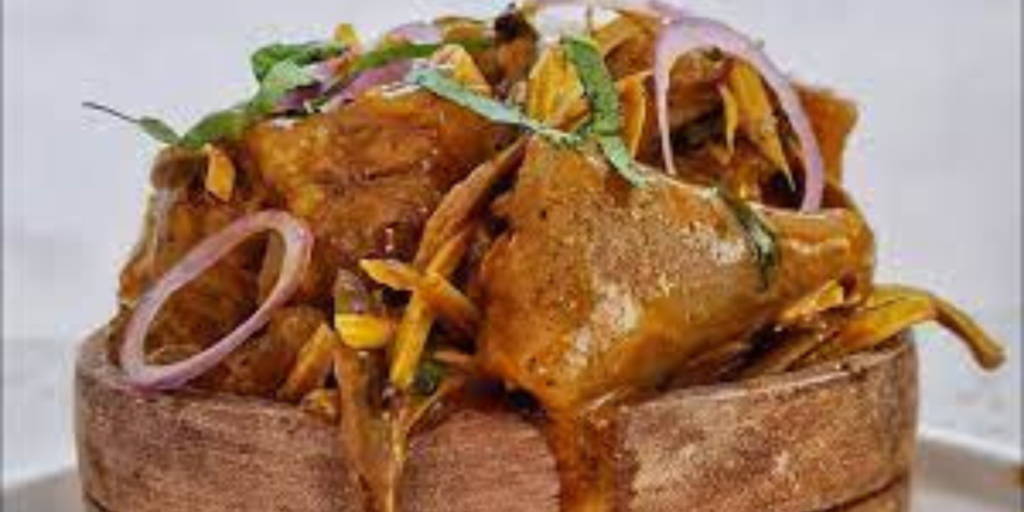
The making of Nkwobi involves a variety of ingredients, each contributing to the dish’s unique flavor and texture. The primary ingredients include cow’s foot, potash (akanwu), palm oil, utazi leaves, and a blend of spices. Let’s explore the significance of each ingredient in detail.
Cow’s Foot
The cow’s foot is the star ingredient of Nkwobi. It is rich in collagen, which, when cooked, gives the dish its distinctive gelatinous texture. Collagen is not only important for the dish’s consistency but also offers health benefits, such as improving joint health and skin elasticity. The process of preparing the cow’s foot involves thorough cleaning and prolonged boiling to achieve the desired tenderness.
How To make Semo Into Puff Puff in 2024 Best Recipe
Potash (Akanwu)
Potash, known locally as akanwu, is a crucial component in the preparation of Nkwobi. It acts as a thickening agent and also helps to emulsify the palm oil, giving the dish its characteristic creamy texture. Potash is derived from the ashes of burnt plantain peels or other plants and has been used traditionally in various African cuisines.
Palm Oil
Palm oil is a staple in many West African dishes, including Nkwobi. It imparts a rich, vibrant color and a unique flavor to the dish. Palm oil is extracted from the fruit of the oil palm tree, which is abundant in the region. It is a source of healthy fats and vitamins, making it a nutritious addition to the meal.
Utazi Leaves
Utazi leaves, known for their slightly bitter taste, add a layer of complexity to Nkwobi. They are used as a garnish and also incorporated into the dish to balance the richness of the cow’s foot and palm oil. Utazi leaves are not only valued for their flavor but also for their medicinal properties, such as aiding digestion and improving appetite.
Spices and Seasonings
A blend of indigenous spices and seasonings is essential to Nkwobi’s flavor profile. These typically include ground crayfish, pepper, onions, and sometimes ehuru (calabash nutmeg). Each spice contributes to the depth and complexity of the dish, creating a symphony of flavors that tantalizes the taste buds.
Best Puff Puff Recipe For 100 People
Preparation Process
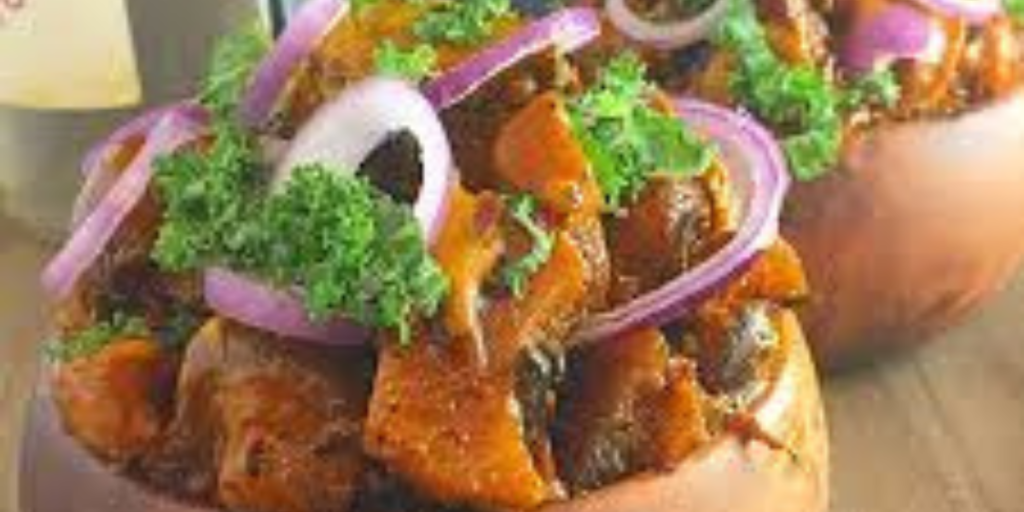
The preparation of Nkwobi is an art that requires patience, skill, and attention to detail. It involves several steps, from cleaning and boiling the cow’s foot to mixing the ingredients and perfecting the final presentation. Let’s walk through the process step by step.
Cleaning and Boiling the Cow’s Foot
The first step in preparing Nkwobi is to thoroughly clean the cow’s foot. This involves scraping off any hair and washing it with water and salt. Once cleaned, the cow’s foot is cut into smaller pieces and placed in a pot of water. It is then boiled for several hours until it becomes tender. This step is crucial as it ensures that the cow’s foot achieves the right texture and absorbs the flavors of the other ingredients.
Preparing the Potash Solution
While the cow’s foot is boiling, the potash solution is prepared. Potash is dissolved in a small amount of water and then filtered to remove any impurities. This solution is set aside and will be used later to emulsify the palm oil.
Mixing the Palm Oil and Potash
In a separate bowl, the palm oil is mixed with the potash solution. This mixture is stirred continuously until it thickens and turns a vibrant orange color. The emulsification process is key to achieving the creamy consistency that Nkwobi is known for.
Combining the Ingredients
Once the cow’s foot is tender, it is removed from the pot and allowed to cool slightly. The palm oil and potash mixture is then poured over the cow’s foot, ensuring that each piece is well coated. Ground crayfish, pepper, and other seasonings are added, and the dish is stirred thoroughly to combine all the flavors.
Final Touches and Serving
The final step involves garnishing the dish with chopped utazi leaves and onions. Nkwobi is typically served warm in a wooden bowl, accompanied by a side of chilled palm wine or beer. The presentation is simple yet elegant, reflecting the dish’s traditional roots.
Cultural Significance
Nkwobi is more than just a meal; it is a cultural symbol that brings people together. It is often served at social gatherings, celebrations, and family reunions, where it fosters a sense of community and belonging. In Igbo culture, sharing a meal of Nkwobi is a way of expressing hospitality and goodwill.
Puff Puff Recipe for 5kg Flour Best of 2024
Nkwobi in Contemporary Nigerian Society
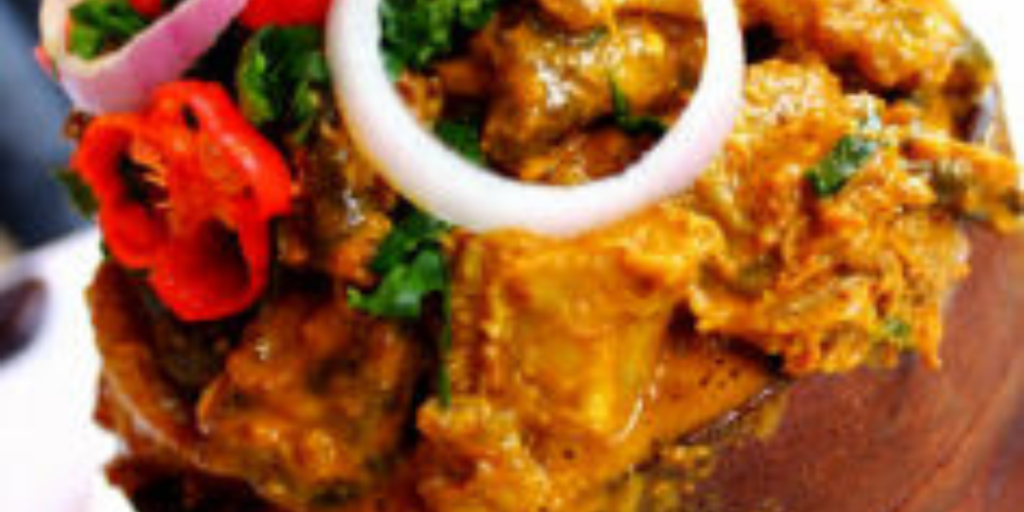
In contemporary Nigerian society, Nkwobi has transcended its traditional roots to become a popular dish across the country. It is enjoyed by people from various ethnic backgrounds and is a common feature in Nigerian restaurants and eateries. The dish has also gained international recognition, with Nigerian chefs introducing it to global audiences through food festivals and culinary events.
Health Benefits
Nkwobi is not only delicious but also nutritious. The cow’s foot is a good source of protein and collagen, which are essential for muscle and joint health. Palm oil, despite its high-fat content, is rich in vitamins A and E, which are important for eye health and immune function. Utazi leaves and the spices used in Nkwobi also offer various health benefits, such as improving digestion and providing antioxidants.
Variations
While the traditional Nkwobi recipe is widely celebrated, there are several variations of the dish that reflect the creativity and diversity of Nigerian cuisine. Some variations include the use of different meats, such as goat or chicken, or the addition of vegetables and other local ingredients. Each variation offers a unique twist on the classic recipe, catering to different tastes and preferences.
Goat Meat
One popular variation is made with goat meat instead of cow’s foot. Goat meat, known for its rich flavor and tender texture, is a common alternative that adds a new dimension to the dish. The preparation process remains largely the same, with the goat meat being boiled until tender and then coated in the palm oil and potash mixture.
Chicken Nkwobi
For those who prefer poultry, chicken variation is another delightful variation. The chicken is usually cut into small pieces and boiled until it is tender. The rest of the preparation follows the traditional method, resulting in a dish that is lighter but equally flavorful.
Vegetable Nkwobi
Vegetable Variation is a vegetarian-friendly option that replaces the cow’s foot with a medley of vegetables. Common choices include mushrooms, eggplant, and bell peppers, which are cooked until tender and then mixed with the palm oil and potash sauce. This variation offers a healthy and colorful alternative to the traditional recipe.
How To Make Thick Banga Soup . Best of 2024
Nkwobi in the Diaspora

Nkwobi’s popularity is not limited to Nigeria; it has also made its way to the Nigerian diaspora around the world. Nigerian immigrants and expatriates have introduced the dish to their new communities, where it has been embraced for its unique flavors and cultural significance. In cities with large Nigerian populations, such as London, New York, and Toronto, Nkwobi is a staple in Nigerian restaurants and a beloved dish at cultural events.
The Joy of Eating
Eating Nkwobi is an experience that engages all the senses. The aroma of the spices, the vibrant color of the palm oil, the tender texture of the cow’s foot, and the slightly bitter taste of the utazi leaves all come together to create a memorable dining experience. The dish is often enjoyed with friends and family, making it a social event as much as a culinary one.
The Role of Nkwobi in Social Gatherings
It plays a significant role in social gatherings and celebrations. It is often served at weddings, festivals, and family reunions, where it acts as a centerpiece that brings people together. The dish’s communal nature encourages sharing and conversation, fostering a sense of camaraderie among those who partake in it.
Nkwobi and Nigerian Hospitality
In Nigerian culture, hospitality is highly valued, and sharing a meal is one of the most common ways to express it. Serving it to guests is a gesture of goodwill and a demonstration of the host’s generosity. The preparation and presentation of Nkwobi reflect the care and effort that go into making guests feel welcome and appreciated.
Modern Takes on Nkwobi
As with many traditional dishes, Nkwobi has seen modern interpretations and adaptations. Contemporary chefs and home cooks alike experiment with different ingredients and techniques, adding new twists to the classic recipe while preserving its essence. These modern takes on Nkwobi reflect the dish’s adaptability and its ability to evolve with changing tastes and trends.
Fusion Nkwobi
Fusion Nkwobi incorporates elements from other cuisines to create a unique culinary experience. For example, some chefs blend Asian or European flavors with traditional Nkwobi ingredients, resulting in a dish that is both familiar and novel. This approach highlights the versatility of Nkwobi and its potential to be enjoyed by a global audience.
How To Make Egusi Soup with Ugu Best recipe Of 2024
Nkwobi in Fine Dining
Nkwobi has also made its way into fine dining establishments, where it is presented with a touch of elegance and sophistication. High-end restaurants may serve Nkwobi as an appetizer or a main course, accompanied by carefully selected side dishes and wines. This elevation of Nkwobi in the culinary world underscores its status as a beloved and respected dish.
Cooking Nkwobi at Home
For those who want to try making Nkwobi at home, the process can be both rewarding and enjoyable. While it requires some time and effort, the end result is well worth it. Here is a detailed guide to preparing Nkwobi in your own kitchen.
Ingredients
- Cow’s foot (2 pounds)
- Palm oil (1 cup)
- Potash (1 teaspoon)
- Utazi leaves (a handful)
- Ground crayfish (2 tablespoons)
- Pepper (to taste)
- Onions (1 medium, finely chopped)
- Salt (to taste)
- Water (as needed)
Instructions
- Clean the Cow’s Foot: Start by thoroughly cleaning the cow’s foot. Scrape off any hair and wash it with water and salt. Cut the cow’s foot into smaller pieces.
- Boil the Cow’s Foot: Place the cow’s foot in a large pot of water. Bring it to a boil and cook for several hours until it becomes tender. You may need to add more water during the cooking process.
- Prepare the Potash Solution: Dissolve the potash in a small amount of water and filter it to remove any impurities. Set the solution aside.
- Emulsify the Palm Oil: In a separate bowl, mix the palm oil with the potash solution. Stir continuously until the mixture thickens and turns a vibrant orange color.
- Combine the Ingredients: Once the cow’s foot is tender, remove it from the pot and allow it to cool slightly. Pour the palm oil and potash mixture over the cow’s foot, ensuring that each piece is well coated. Add the ground crayfish, pepper, onions, and salt. Stir thoroughly to combine all the flavors.
- Garnish and Serve: Garnish the dish with chopped utazi leaves and additional onions if desired. Serve warm in a wooden bowl or a serving dish.
Enjoying Nkwobi
Nkwobi is best enjoyed with a side of chilled palm wine or beer. The combination of flavors and textures, along with the refreshing drink, makes for a delightful dining experience. Whether you are sharing it with family and friends or savoring it on your own, Nkwobi offers a taste of Nigeria’s rich culinary heritage.
Conclusion
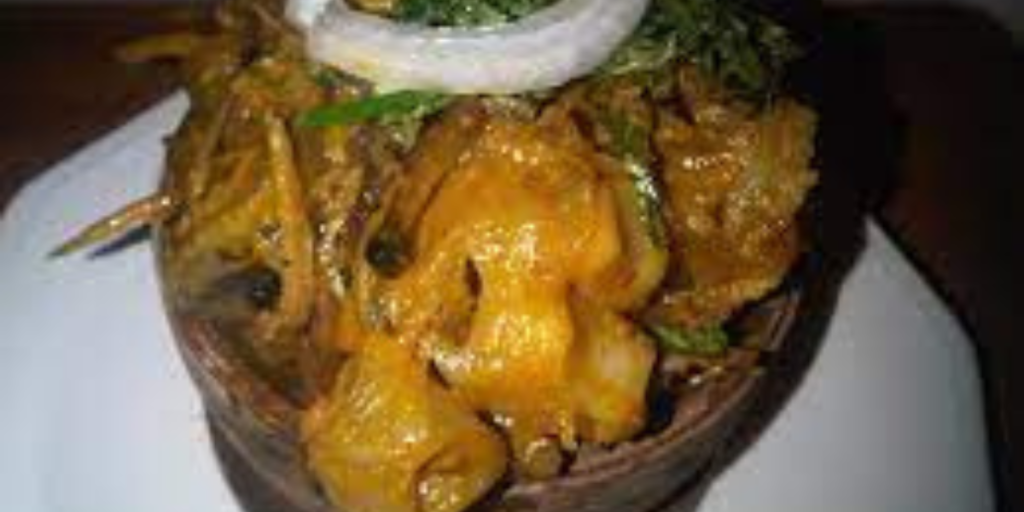
Nkwobi is more than just a meal; it is a testament to the rich culinary heritage of the Igbo people and Nigeria as a whole. Its exquisite taste, cultural significance, and health benefits make it one of Nigeria’s best meals. Whether enjoyed at a family gathering, a social event, or in a restaurant, Nkwobi continues to bring people together and celebrate the diversity and creativity of Nigerian cuisine. As it continues to gain recognition both locally and internationally, Nkwobi stands as a proud symbol of Nigeria’s vibrant food culture and the enduring legacy of its traditional dishes.
A Day in the Life with Nkwobi
Imagine waking up in a bustling Nigerian household on a Saturday morning. The air is filled with the sounds of laughter, music, and the sizzling of ingredients being prepared for a grand family feast. Today, Nkwobi is on the menu, and the anticipation is palpable.
Morning Preparations
The day begins early, with family members gathering in the kitchen to start the preparations. The cow’s foot is meticulously cleaned and cut into pieces. The palm oil is set aside, and the spices and seasonings are laid out on the counter. The aroma of freshly ground crayfish and the sharp scent of potash fill the air, promising a delicious outcome.
Boiling the Cow’s Foot
As the cow’s foot is placed in a large pot of water and set to boil, the kitchen becomes a hive of activity. Laughter and conversation flow as family members catch up on the week’s events. The pot is carefully tended to, ensuring that the cow’s foot cooks to perfect tenderness.
Preparing the Palm Oil Mixture
In a separate bowl, the palm oil is mixed with the potash solution, and the mixture is stirred continuously until it reaches the desired consistency. This step requires patience and a steady hand, as the emulsification process is crucial to the dish’s success.
Combining Flavors
Once the cow’s foot is ready, it is removed from the pot and allowed to cool slightly. The palm oil and potash mixture is poured over the cow’s foot, and the spices and seasonings are added. The dish is stirred thoroughly, ensuring that every piece of meat is coated in the rich, flavorful sauce.
Setting the Table
As the Nkwobi is left to rest, the table is set for the family feast. Wooden bowls and serving dishes are arranged, along with fresh utazi leaves and sliced onions for garnish. A cooler of chilled palm wine and beer is placed nearby, ready to accompany the meal.
The Family Feast
With everything prepared, the family gathers around the table. The Nkwobi is brought out, and the sight of the vibrant dish elicits gasps of delight. Plates are filled, and the first bites are taken. The rich, complex flavors of the Nkwobi are savored, and the meal becomes a joyous celebration of family, culture, and tradition.
The Legacy of Nkwobi
Nkwobi’s legacy extends beyond the dining table. It represents the ingenuity and resilience of the Igbo people, who have transformed simple ingredients into a culinary masterpiece. The dish’s popularity and continued evolution highlight the dynamic nature of Nigerian cuisine and its ability to adapt to changing tastes and trends.
Nkwobi: A Culinary Ambassador
As Nkwobi gains recognition beyond Nigeria’s borders, it serves as a culinary ambassador, introducing the world to the flavors and traditions of Nigerian cuisine. Food festivals, cooking shows, and international restaurants showcase Nkwobi, inviting people from different cultures to experience and appreciate this unique dish.
A Final Thought
Nkwobi is more than just a dish; it is a celebration of Nigerian culture, community, and creativity. Its rich history, bold flavors, and the joy it brings to those who prepare and share it make Nkwobi one of Nigeria’s best meals. Whether enjoyed at a bustling family gathering, a local eatery, or a fine dining restaurant, Nkwobi remains a beloved and enduring symbol of Nigeria’s vibrant culinary heritage.
















